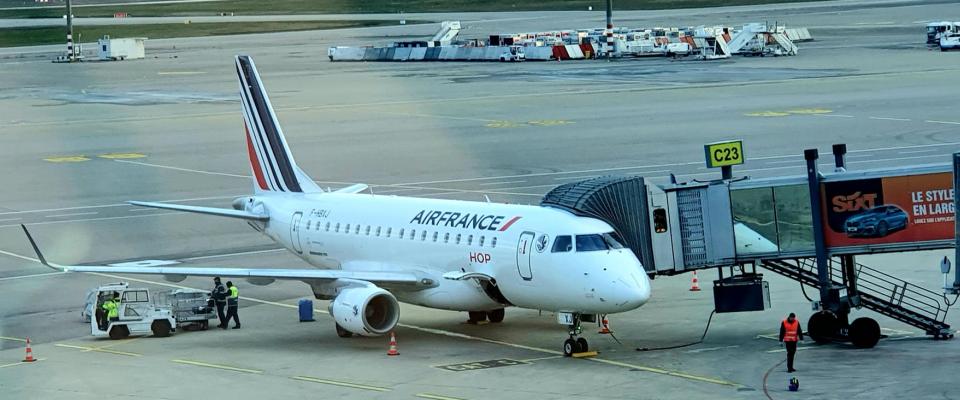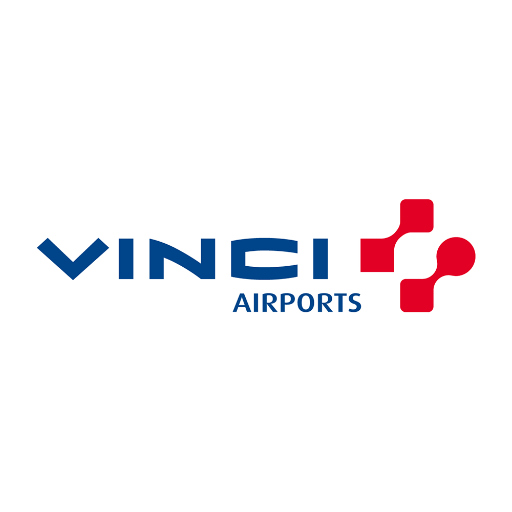Actualités :
VINCI Airports signs a strategic partnership to study and implement a sustainable synthetic fuels supply chain (e-SAF) with the companies H2V and Hy2gen

- E-SAF produced from low-carbon hydrogen will be distributed in Lyon-Saint Exupéry, Lyon Bron and Clermont-Ferrand Auvergne airports by 2030
- The provision of SAF is an integral part of VINCI Airports’ strategy for supporting the decarbonization of the aviation sector
- Sustainable fuels are already distributed on several platforms operated by VINCI Airports in France and Europe
At the Hyvolution trade show, H2V, Hy2gen and VINCI Airports signed an agreement to study the methods of production and supply of synthetic sustainable aviation fuels, or e-SAF, by 2030 intended for commercial airlines operating at Lyon-Saint Exupéry, Lyon Bron and Clermont-Ferrand Auvergne airports. In a second phase, this study will be extended to the Alpine airports operated by VINCI Airports (Grenoble, Annecy, and Chambéry).
Developed from low-carbon hydrogen, these e-SAFs will be produced on the site of the consortium formed between H2V and Hy2gen, under development in Fos-sur-Mer, France.
E-SAFs reduce greenhouse gas emissions by 86% compared to kerosene [1]. Their use does not require any modification of airport facilities or of the aircrafts’ propulsion systems.
This project is part of VINCI Airports' policy to act on the CO2 emissions of its clients and partners (scope 3). At the same time, VINCI Airports has set itself the objective of achieving "zero net emissions" on its direct emissions (scopes 1 and 2) by 2030 in the European Union as well as in London Gatwick and Edinburgh.
Sustainable Aviation Fuels (SAF) represent a short-term solution to decarbonize aviation and are an integral part of the ambitious environmental strategy pursued by VINCI Airports since 2016 to reduce its carbon footprint and engage its stakeholders in the same movement.
Anticipating the European ReFuelEU Aviation regulation, which imposes the progressive use of SAF,
VINCI Airports has been a pioneer in the distribution of SAF in France and Europe since 2021, and now offers them at its platforms of Toulon, Saint Nazaire, Clermont-Ferrand, Budapest and soon Annecy.
In addition to proposing the use of SAFs, VINCI Airports' main actions to decarbonize the value chain in collaboration with its stakeholders are:
- Carbon modulation of landing fees: VINCI Airports was the first airport operator to implement a modulation of landing fees based on airlines' carbon emissions. Airlines using SAFs thus benefit from a bonus under this scheme.
- Reduction of emissions from airport operations: VINCI Airports is implementing measures to reduce emissions from airport operations, such as the use of electricity from renewable sources, the electrification of vehicle fleets, APU-off solutions (limiting the use of auxiliary power units), etc.
- Promoting sustainable modes of transport: VINCI Airports encourages the use of sustainable modes of transport to access airports, including public transport and electric vehicles. More than 700 charging stations for electric vehicles and machines have already been deployed across its worldwide network.
- Passenger awareness: VINCI Airports raises passenger awareness on sustainable development challenges and encourages them to adopt responsible behaviour, for example by offering a voluntary contribution for reforestation projects.
- For the longer term, VINCI Airports has launched several structuring hydrogen projects, in contributing in particular to the initiation of the Clean Hydrogen Infrastructure Fund operated by Hy24, the world's leading private asset manager dedicated to the deployment of the hydrogen economy, with the support of TotalEnergies and Air Liquide. This fund notably participated in a fundraising in Hy2Gen, a member of the consortium that will produce the e-SAF.
Guillaume DUBOIS, Technical Director of VINCI Airports, said: "This partnership once again demonstrates VINCI Airports' commitment to the decarbonization of air transport, which we are fully implementing here on several platforms operated in France. We are pleased with this progress and remain committed to contribute, alongside industrial players, to developing less carbon-intensive aviation."
[1] According to the life cycle analysis carried out during the pre-feasibility study.
VINCI Airports
The world's leading private airport operator, VINCI Airports operates more than 50 airports in 11 countries in Europe, Asia and the Americas. Thanks to its expertise as a global integrator, VINCI Airports develops, finances, builds and manages airports by providing its investment capacity and...

